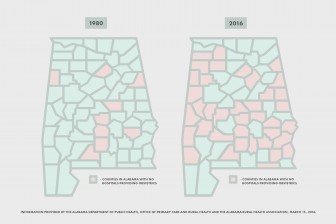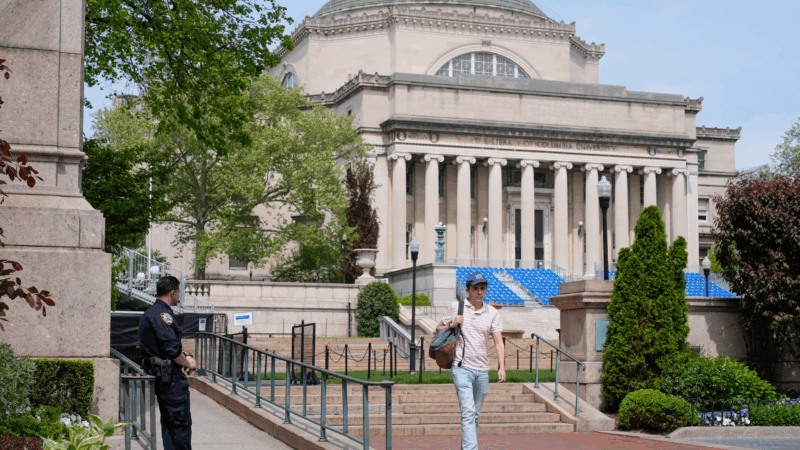An Alternative to Delivering Babies at the Hospital
Alabama has the second-highest infant mortality rate. And more rural hospitals are closing, leaving tens of thousands without convenient access to health care. That includes expectant mothers. A bill to decriminalize midwifery passed in the legislature last year. Now some physicians and nonprofits say for mothers-to-be, birth centers are a way to provide cheaper and safer prenatal care and delivery.
Dr. Jessana Cooper, an ob-gyn at Simon Williams Clinic in Birmingham, says women in Alabama need better access to obstetrical care. Thirty-eight of the state’s rural counties have no hospitals or ob-gyns. Many women drive more than an hour to deliver their babies or get even basic prenatal care. Others just do without. Some women ask their doctors to perform potentially risky caesarian births because they’re scheduled. Cooper says the state needs alternatives.
“A labor and delivery unit is a very expensive way to take care of pregnant women. It’s basically ICU care, for every single pregnant woman regardless of their health, regardless of their risk factor. It’s an expensive way, it’s a high-risk way, and it actually leads to a lot over-intervention that cause can problems later on.”
Cooper advocates setting up birth centers run by certified nurse midwives. These are registered nurses with master’s degrees trained to provide prenatal care and delivery for normal, low risk pregnancies. Women with high risk pregnancies, say mothers with hypertension or diabetes, would be transferred to a hospital.
“It seems a logical solution to our rural health care crisis because it’s less expensive, proven to have good outcomes, and it’s a wellness model,” she says. “As long as you had an integrated system where you could have good transportation, I think it could solve a lot of our troubles.”
Some studies have shown birth centers improved obstetrical care. A 2013 government study looked at 15,000 births across the country. Vanderbilt University’s Margaret Buxton, a certified nurse midwife, says the findings were significant.
“The data is pretty compelling. It lowers preterm birth rate, it lowers infant mortality.”
It does this at a lower cost than hospitals, which have expensive equipment and are staffed around the clock, she says.
In 2015, Vanderbilt partnered with Baby+Co., a company operating birth centers in three states, to open one in Nashville. Most patients have private insurance, while some pay out-of-pocket.
But proponents want birth centers to be affordable to low-income women as well. So Baby+Co. is working with Tennessee’s Medicaid program on a long-term contract to expand birth centers across the state.
“It’s a huge population of women and we really want to be able to offer this full breadth of services to them as well,” says Buxton, who is also clinical director of Nashville’s Baby+Co.
But for that to happen, Medicaid would have to cover birth centers. According to the Kaiser Family Foundation, Medicaid pays for more than 50% of births in Alabama and across the U.S. The state has struggled to fund its Medicaid program.
But some physicians aren’t convinced birth centers will cut down on infant deaths.
“Birthing centers in my opinion are not the answer, to any of this.,” says Dr. Lynda Gilliam, an oby-gyn hospitalist at Huntsville Hospital. “If you’re talking about high risk patients, they’re not going to be birthing center candidates.”
Dealing with the high-risk pregnancies will require long-term, expensive maternal health care. But birth center advocates say it’s safer and cheaper for them to focus on the low-risk, healthy births.
-Haden Holmes Brown
Editor’s note: A previous version of this story incorrectly said a 2013 government study looked at 15,000 birth centers across the country and found they improved obstetrical care. In fact, it was 15,000 births. It also originally identified Vanderbilt University incorrectly as the University of Vanderbilt.
Chicagoans pay respects to Jesse Jackson as cross-country memorial services begin
Memorial services for the Rev. Jesse Jackson Sr. to honor his long civil rights legacy begin in Chicago. Events will also take place in Washington, D.C., and South Carolina, where he was born and began his activism.
In reversal, Warner Bros. jilts Netflix for Paramount
Warner Bros. says Paramount's sweetened bid to buy the whole company is "superior" to an $83 billion deal it struck with Netflix for just its streaming services, studios, and intellectual property.
Trump’s ballroom project can continue for now, court says
A US District Judge denied a preservation group's effort to put a pause on construction
NASA lost a lunar spacecraft one day after launch. A new report details what went wrong
Why did a $72 million mission to study water on the moon fail so soon after launch? A new NASA report has the answer.
Columbia student detained by ICE is abruptly released after Mamdani meets with Trump
Hours after the student was taken into custody in her campus apartment, she was released, after New York City Mayor Zohran Mamdani expressed concerns about the arrest to President Trump.
These major issues have brought together Democrats and Republicans in states
Across the country, Republicans and Democrats have found bipartisan agreement on regulating artificial intelligence and data centers. But it's not just big tech aligning the two parties.







